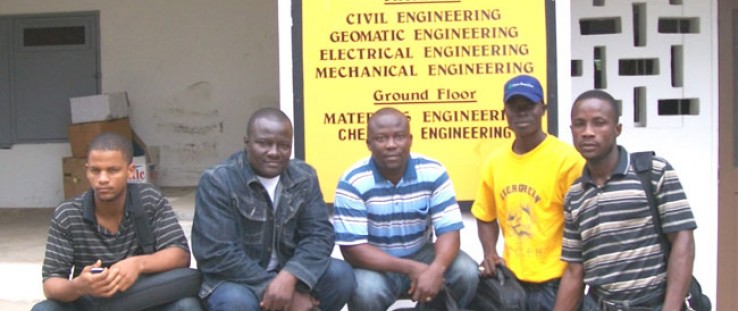 Liberian classmates, left to right, Mahmoud Solomon, Mencer Powoe, Charles Kortimai, Titus Zoneh and Sylvester Bundoo outside the Kwame Nkrumah University of Science and Technology, College of Engineering in Ghana. The five students are pursuing master’s
Mencer Powoe
Liberian classmates, left to right, Mahmoud Solomon, Mencer Powoe, Charles Kortimai, Titus Zoneh and Sylvester Bundoo outside the Kwame Nkrumah University of Science and Technology, College of Engineering in Ghana. The five students are pursuing master’s
Mencer Powoe
 Liberian classmates, left to right, Mahmoud Solomon, Mencer Powoe, Charles Kortimai, Titus Zoneh and Sylvester Bundoo outside the Kwame Nkrumah University of Science and Technology, College of Engineering in Ghana. The five students are pursuing master’s
Mencer Powoe
Liberian classmates, left to right, Mahmoud Solomon, Mencer Powoe, Charles Kortimai, Titus Zoneh and Sylvester Bundoo outside the Kwame Nkrumah University of Science and Technology, College of Engineering in Ghana. The five students are pursuing master’s
Mencer Powoe
It all started with a bulletin in the local newspaper—“Help Rebuild Liberia, Earn a Master’s Degree.” Mencer Powoe, from Lofa County, had been looking for scholarship opportunities to study abroad. So when he saw the advertisement, he applied.
In 2011, Powoe was accepted into the program. He is now entering his second year at the Kwame Nkrumah University of Science and Technology (KNUST) in Kumasi, Ghana, studying geomatic engineering.
“Before I began this program, I was working as an engineer on infrastructure projects for three counties in Liberia. I was also a teaching assistant at the University of Liberia,” explains Powoe, who earned an undergraduate degree from the University of Liberia. “When I learned about the chance to earn a master’s degree through the USAID-led program, I applied right away. The opportunity will not only benefit my family and me, but it will benefit the entire country.”
Powoe and four other young people from Liberia are currently pursuing master’s degrees as part of a USAID program to strengthen the government’s capacity to administer land laws and policies across the country. The program is managed by USAID as part of a nationwide development plan funded through the Millennium Challenge Corporation Threshold Program, a U.S. Government development initiative. One of the main components of the program is rebuilding land administration capacity to improve land rights and access.
Tim Fella, a land conflict specialist at USAID, explains the importance of this component to the program: “Clear access and secure rights to land are a fundamental component of USAID’s development agenda. In many countries, competition over land, and the resources found on land, drive conflict. Our work in Liberia and other countries demonstrates that rebuilding capacity in the land administration systems can help promote stability by reducing tension, and set the stage for productive investments and growth, which, in turn, can decrease conflicts.”
Emerging from War
Addressing Liberia’s land challenges after a 14-year civil war is complicated. The conflict ended in 2003 and left the country fragile. By some estimates, 300,000 people—10 percent of the population—were killed. The economy was in tatters; some government offices were completely destroyed; and electricity, roads, bridges and other basic municipal services were severely damaged. Despite some improvements, it is still difficult to provide basic government services and adopt new technologies. And professionals with all the necessary skills to implement reforms and meet the technical demands are also still in short supply.
Powoe pursued his studies throughout the war, but encountered frequent delays. At times, travel between his home and school was unsafe. But Powoe persevered. Due to the violence, many youth gave up on their educational goals or had no access to higher learning. In two decades, only a handful of young people received college educations. Much of the professional workforce that remains in Liberia is preparing for retirement and is unfamiliar with the latest industry advances.
In the field of land administration, there are few Liberians with modern surveying skills. This knowledge gap makes it difficult to identify and accurately mark boundaries between property claims.
Through the master’s degree program, the USAID-sponsored students are learning to use current survey equipment, create digital property records and generate maps using field data and GIS technologies.
“Liberia’s land disputes result from a number of factors including: impreciseand overlapping land allocations, displacement and resettlement of populations as a result of the war, a shortage of qualified surveyors to demarcate land boundaries, and granting of state concessions with ill-defined boundaries and current occupation,” says Fella. “Thus, training these youth in land surveying and mapping techniques will help improve the country’s ability to document and record property rights, thereby reducing the potential for competing claims and, ultimately, conflict.”
Resolving Conflict
Many of Liberia’s disputes that continue today are over property rights. Whether it’s a battle over forest tree use or someone attempting to return to land they lived on before the violence began, property disputes occur daily. Even small conflicts result in burdens to the legal system and wasted resources that could be better used rebuilding the country.
“If we don’t solve our land issues, we will go back to war,” explained Powoe. “Reforms to Liberia’s land sector will lead to quick conflict resolution and bring peace and security to the country.”
After completing the program, Powoe and his Liberian classmates will return to their country and work for the government to implement reforms in the land administration sector. USAID is helping the government’s land administration office gain access to technologies such as computers, software licenses, survey equipment, electric generators and other items—all necessary for the students to apply their knowledge in the field.
While on semester break this summer, Powoe and his classmates returned to Liberia and completed a demonstration project. They used the new equipment and software to complete a land rights map for two neighborhoods in Monrovia, Liberia’s capital. While using their new skills, students carefully monitored the time it took to complete the project so they would have a baseline for future work. During the survey portion of the project, they worked alongside current government staffers so the older-generation land specialists could begin to learn the new methods and equipment.
Completing the Circle
As a condition for receiving the education scholarships from USAID, the students, after completing their degree, will help faculty and other officials at the University of Liberia develop a new curriculum in land surveying and administration. This will ensure that the new skills are passed on to other young Liberians and it will also help achieve USAID’s goals of building strong local capacity.
Related Content
Powoe proudly says: “When I return to Liberia after completing my degree, I want the knowledge I have to multiply. I want to teach others basic survey methods and computer mapping. I want to advance my country forward by training the next generation of government workers and leaders.”
When asked if he thinks someday he will be a university faculty member teaching land administration, Powoe laughed and said: “Well, that would be quite nice, wouldn’t it?”
For Liberia, its entire people, and especially its youth—yes it would.







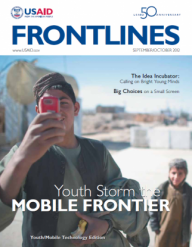

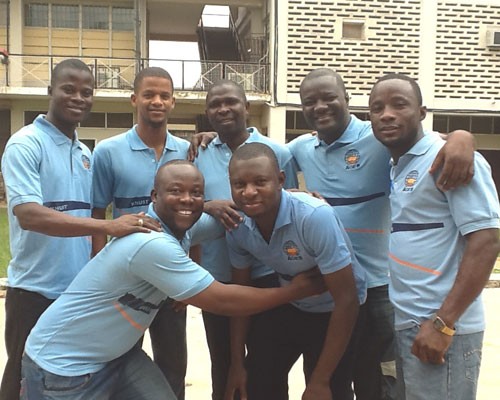
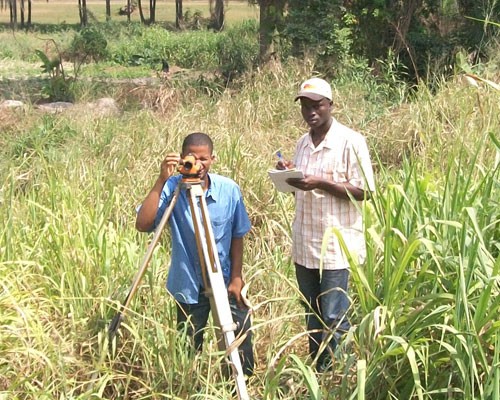
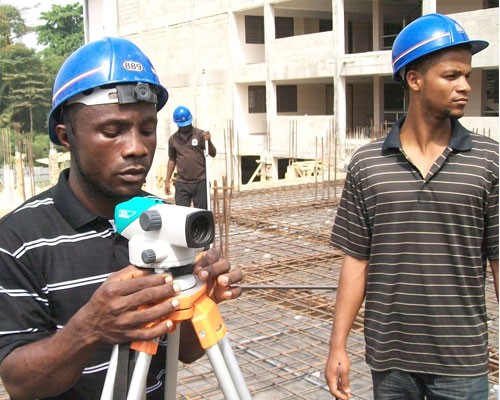
Comment
Make a general inquiry or suggest an improvement.